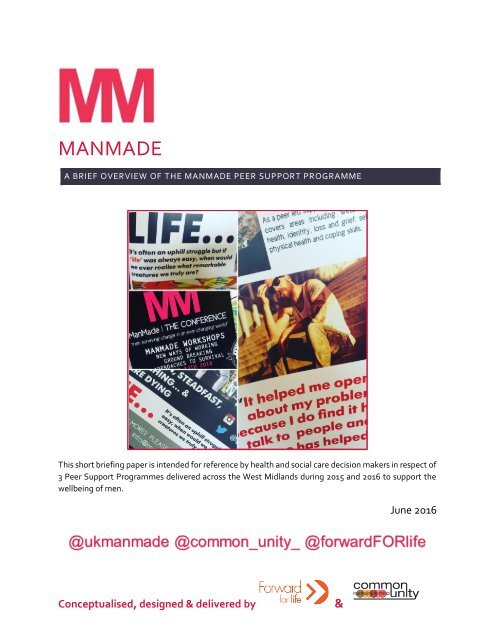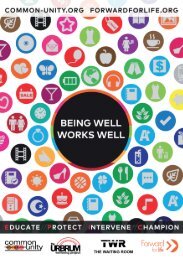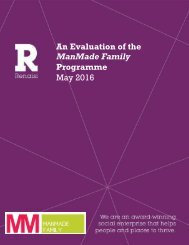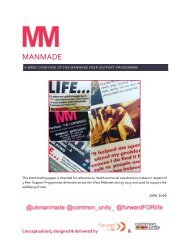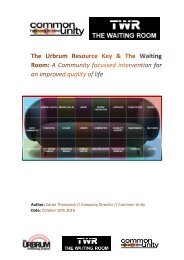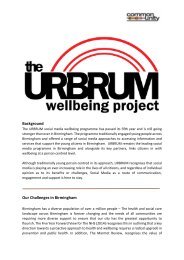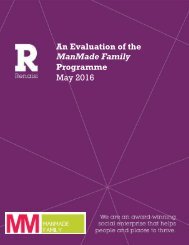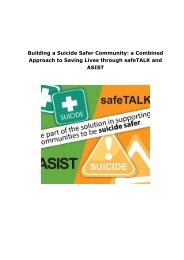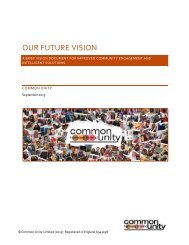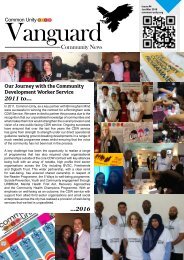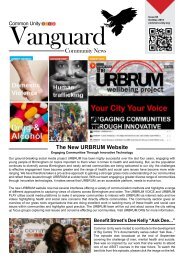ManMade_Briefing
You also want an ePaper? Increase the reach of your titles
YUMPU automatically turns print PDFs into web optimized ePapers that Google loves.
MANMADE<br />
A BRIEF OVERVIEW OF THE MANMADE PEER SUPPORT PROGRAMME<br />
This short briefing paper is intended for reference by health and social care decision makers in respect of<br />
3 Peer Support Programmes delivered across the West Midlands during 2015 and 2016 to support the<br />
wellbeing of men.<br />
June 2016<br />
Conceptualised, designed & delivered by &
EXECUTIVE SUMMARY<br />
The <strong>ManMade</strong> programme successfully supports men to be able to talk more openly about their<br />
emotions, to build their confidence and self-esteem, to know where to go for help and to support<br />
others in the community. This is achieved through an eight-week workshop programme which<br />
includes peer discussion, information sharing and self-reflection on a range of health and wellbeing<br />
topics, underpinned by person centred facilitation approaches.<br />
The key findings from the evaluations are:<br />
There are many areas of good practice built into the <strong>ManMade</strong> model being:<br />
1. A person centred facilitation approach<br />
2. A combination of facilitated informal discussion, provision of information by subject experts<br />
and experiential activities.<br />
3. An awareness of how gender identity impacts on mental health.<br />
4. Participants benefitting from sharing experiences with other men from similar<br />
backgrounds/ages, suggesting that <strong>ManMade</strong> programmes should be tailored to different<br />
groups.<br />
5. The programme supports men to increase their understanding of mental health, themselves<br />
and others; to be able to discuss personal issues with others, and to be more aware of<br />
services and support networks. Accumulatively these supported participants to develop<br />
greater self-confidence and self-esteem and to supports in the community.<br />
BROADER CONTEXT<br />
The Phenomenon of Suicide<br />
Suicide is one of the last big taboos' in modern day society; a phenomenon that effects so many people<br />
in our communities in so many ways and yet has not been tackled within our communities.<br />
In Britain, each year, more than 6000 people kill themselves; that’s 4000 more deaths per year than occur<br />
on all our roads. Over 75% of all suicides completed are by men.<br />
It has been identified that there are key identifiable factors that increase the likelihood of suicidal<br />
ideation and behaviour. Such factors that are associated with suicide include social factors, cultural<br />
factors, economic crisis, work stresses, mental health difficulties, family issues, substance misuse, sexual<br />
orientation, individual crisis, bullying and more recently, the recognition of the conflict between more<br />
traditional gender identities and modern society.<br />
Where a multiple of these factors is applicable to an individual, there is a heightened level of risk in<br />
respect of that individual and their propensity for considering suicide as a realistic option.<br />
Conceptualised, designed & delivered by &
Preventing suicide in England: A cross-government outcomes strategy to save lives (2012) states<br />
“there are direct links between mental ill health and social factors such as unemployment and<br />
debt. Both are risk factors for suicide. Previous periods of high unemployment and/or severe<br />
economic problems have been accompanied by increased incidence of mental ill health and<br />
higher suicide rates.”<br />
Unemployment and Suicide<br />
Between 2000 and 2011, one in five of an estimated 233,000 annual suicides globally were linked to<br />
unemployment. An international study of the impact of recession and unemployment on suicide was<br />
published in 2015 concluding suicides associated with unemployment totaled about 45,000 annually,<br />
making up about 20% of all suicides 1 . It is also important to note though that this study also showed that<br />
unemployment was a stronger factor for suicidal ideation than recession itself meaning that even in times<br />
of relative prosperity, the experience of unemployment has devastating effects on the individual<br />
experiencing job loss which may increase the risk of suicide through mechanisms such as an increased<br />
risk of depression, financial strain and reduced affordability of mental health care. This study also<br />
highlights how employment is not always a precursor to improved wellbeing and reduced likelihood of<br />
suicidal behaviour in highlighting that falling income, zero hour contracts, job insecurity and debt can<br />
often be associated with suicide.<br />
English regions with the largest rises in unemployment have had the largest increases in suicides,<br />
particularly among men. Recent figures for the West Midlands showed that suicide rates have increased<br />
by 24 per cent, with 2007 data recording 245 deaths by suicide/undetermined deaths and the 2010 data<br />
showing 450 recorded deaths.<br />
Identity and Suicide<br />
According to the Samaritans 2 many men compare themselves against a masculine ‘gold standard’ which<br />
prizes power, control and invincibility. Having a job and providing for the family is central to this, especially<br />
for working class men and when this gold standard is no longer deemed to be being met such men may<br />
feel a sense of defeat and/or shame leading to contemplation of suicide. This ideal man being a socially<br />
constructed aspect of hegemonic masculinity, also means that emotional withdrawal and rigidity – a<br />
reduced likelihood of seeking help - may influence gender differences in suicidal behaviours.<br />
Studies have shown that men are less likely than women to consult for most conditions 3 , and for mental<br />
health and emotional problems specifically. The reasons for this could be argued to involve the way in<br />
1<br />
Nordt C, Warnke I, Kawohl W. Modelling suicide and unemployment: a longitudinal analysis covering 63<br />
countries, 2000–11. The Lancet Psychiatry. Published online February 11 2015<br />
2<br />
http://www.samaritans.org/sites/default/files/kcfinder/files/Samaritans_Men_and_Suicide_Report_web.pdf<br />
3<br />
Canetto, S.S. & Sakinofsky, I. (1998). The gender paradox in suicide. Suicide and Life Threatening Behavior, 28,<br />
1–23.<br />
Conceptualised, designed & delivered by &
which norms of masculinity are constructed to include a denial of pain, emotional sensitivity and anxiety.<br />
Asking for help, even in the face of possible suicide, may be viewed by many men as feminine behaviour,<br />
and if men are to live up to expectations of strength and independence, they are required to sort out their<br />
mental and physical problems on their own. 4<br />
For many men, not coping is seen as an indicator of weakness and depression is a mental illness that for<br />
many is still viewed as inconsistent with a masculine identity. Studies have demonstrated that men’s<br />
response to depression often involves social withdrawal (including hiding symptoms from others),<br />
unwillingness to consult healthcare professionals, and a denial of symptoms 5<br />
THE THINKING BEHIND OUR APPROACH<br />
In respect of the original opportunity to develop a programme to support unemployed men who were at<br />
risk of suicide, Forward for Life and Common Unity viewed the Manmade Programme (as it came to be<br />
known) as a way to do things a little differently from the traditional norm. The programme proposed was<br />
peer support based in approach whilst utilising the Five Ways to Well-Being framework in a format that<br />
was able to be engaged with fully by the ‘target audience’ of ‘vulnerable’ men.<br />
The Five Ways To WellBeing 6 was seen as key in ensuring the greatest impact upon the wellbeing of<br />
participants as mental health needs and vulnerabilities to suicidal ideation are best addressed via a<br />
4<br />
Courtenay, W.H. (2000). Constructions of masculinity and their influence on men’s well-being. Social Science<br />
and Medicine, 50, 1385–1401<br />
5<br />
Canetto, S.S. & Sakinofsky, I. (1998). The gender paradox in suicide. Suicide and Life Threatening Behavior, 28,<br />
1–23.<br />
6<br />
http://www.neweconomics.org/projects/entry/five-ways-to-well-being<br />
Conceptualised, designed & delivered by &
holistic approach and not through solely concentrating efforts on risk reduction often associated with<br />
mental health problems.<br />
We believe that individuals who have thoughts of suicide must have their needs addressed including<br />
providing individuals with the necessary internal resilience tools, self-care skills, personal sense of the<br />
self and knowledge of services that engender opportunities for satisfactory living.<br />
<strong>ManMade</strong> therefore is very much an upstream approach – it doesn’t start with identification of illness and<br />
potential cure, it doesn’t look to come into play at the point of addressing the devastation caused by<br />
suicidal behaviour – what it does is recognise that through an emphasis on education, promotion,<br />
prevention and protection the number of vulnerable people coming to the point of contemplating suicide<br />
as the only rational option available is reduced.<br />
Aspirations in respect of a self-determined quality of life is very much on the agenda with <strong>ManMade</strong><br />
members. The approach supports men to identify and adopt new approaches that enables them to better<br />
deal with as well as more readily accept and understand both internal and external challenges. Focus is<br />
on the origins of good health and not the causes of disease. A Salutogenic Approach.<br />
THE MANMADE PROCESS<br />
The programme seeks to:<br />
<br />
<br />
<br />
<br />
Provide a safe and supportive space to express feelings and learn about mental health<br />
To empower men to better understand themselves and their own mental health<br />
To equip men with the skills, tools, information and options to manage their mental health and<br />
wellbeing<br />
To develop a peer support network for men<br />
Over a delivery period of 8 weeks, with 8 themed workshops we have engaged 3 separate cohorts of<br />
‘vulnerable’ men utilising experiential sessions based on a number of key themes that have an impact in<br />
respect of:<br />
<br />
<br />
<br />
<br />
mental health awareness<br />
confidence building<br />
promoting self-esteem<br />
personal identity<br />
<br />
<br />
<br />
<br />
assisting life<br />
self-care and well-being<br />
physical health<br />
loss and bereavement<br />
The approach being based on the New Economics Foundation’s Five Ways to Well-being suggests that<br />
mental health needs and vulnerabilities to suicidal ideation are often better addressed via a holistic<br />
approach which includes internal resilience tools, self-care skills and knowledge.<br />
An often cited challenge regarding the Five Ways To Well-being is how to ensure the Five Ways are best<br />
presented in a format most appropriate to, and most likely to be adopted by, the ‘target group.’<br />
<strong>ManMade</strong> does this through using the Five Ways to Well-being as an initial reference point to the area<br />
Conceptualised, designed & delivered by &
under discussion but importantly trusts much of the dialogue, debate and learning emanating from this<br />
reference point to the men themselves.<br />
THE MANMADE TOOLS<br />
……and the men themselves<br />
MANMADE FEEDBACK<br />
The Facilitators<br />
“They’re good people. They don’t judge you. You can talk to them as though you’ve known<br />
them for years.”<br />
“In the first session I came to scope it out. It was relaxed and nice and that’s why I came<br />
back each week. If you don’t feel comfortable you ain’t gona go”<br />
Identity<br />
“He said looking after your kids is just [as important as going to work]. It made me feel more<br />
relaxed straight away”<br />
Conceptualised, designed & delivered by &
The Content<br />
“What I’ve learnt through the course…it just makes me think why is this happening. I would<br />
love to go more in-depth in it.”<br />
The Space to talk<br />
“If it’s a stiff environment you’re not gonna talk. It’s really relaxed.”<br />
Reflection<br />
“It was about how you perceive it. What you perceive isn’t wrong, but you see the bigger<br />
picture”<br />
“It’s really useful. It makes you think about it again, and gets you looking forward to the<br />
week after.”<br />
WEMWEBS<br />
In all 3 of the <strong>ManMade</strong> Programmes, all using the same approach and the same specialist Associates in<br />
the delivery of the programme, the wellbeing score for each group demonstrated a clear improvement<br />
in well-being for the period the men were engaged with <strong>ManMade</strong>.<br />
Conceptualised, designed & delivered by &
For more information on <strong>ManMade</strong>, Suicide Prevention and our upstream approach to health<br />
please get in touch.<br />
Conceptualised, designed & delivered by &


